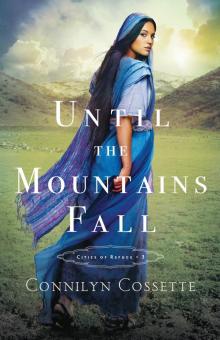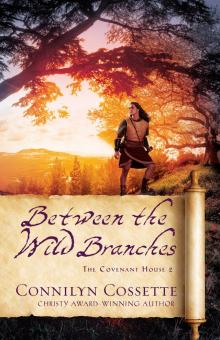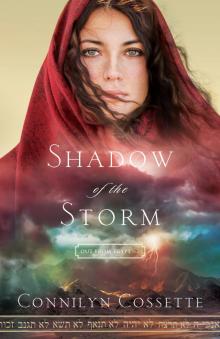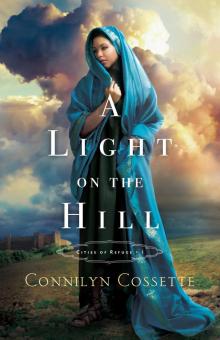- Home
- Connilyn Cossette
Shadow of the Storm Page 3
Shadow of the Storm Read online
Page 3
He peered up at me, his face pale and troubled. “He returned just after sunrise.” He tipped his head toward the tent he shared with Eben. “Your mother and Kiya are in there with him, and a healer as well.”
Relief rushed out of me in a huff of air. Only someone still living would need a healer. “What happened?”
“He will live. The sword only grazed his side, but his hand is wounded. They are unsure whether he will have use of it again.”
My brother built musical instruments; his livelihood dependent on the use of those skilled hands. Music was like air to my brother, he would suffocate without it. As heartsick as I was for my brother, I knew Jumo felt the same. Eben had become a brother to him since we left Egypt—and, in some ways, a replacement for the father who died with the other Egyptian firstborn sons.
There was nothing either of us could do for the brother we loved except wait. Without a word, I sat beside Jumo, drew up my own knees, and tucked my head into the gap.
Although I tried to concentrate on lifting prayers to Yahweh for Eben’s quick healing, my mind returned again and again to Reva’s tempting suggestion that I learn midwifery alongside her. A fleeting image bubbled up—a picture of myself as a midwife, holding a baby in my arms and placing it on a new mother’s chest. Trickling though me with the refreshing coolness of a gentle brook, the idea almost seemed to whisper my name. Did I have the courage to approach my mother with such an audacious suggestion?
5
18 TAMMUZ
4TH MONTH OUT FROM EGYPT
Before today, Mosheh had always been a tiny blur against a faraway wall of granite to me. But now only twenty paces separated us from the new stone barrier that divided the mountain from the multitude. The tribe of Levi had been brought close, a reward for faithfulness at great cost. I would finally see our enigmatic leader in person.
My brother stood behind me, wounded side bound and destroyed hand swathed in thick linens—a stark example of the sacrifice the Levites had offered on the altar of loyalty last night. And a horrendous task it had been, for nearly as many Hebrews as gerim lay beneath the desert sand. Three thousand men and women joined together in death by folly.
I wondered how Hadassah and her little boy fared. The young mother should be wrapped in joy over her new son, not dressed in sackcloth for her faithless husband. I searched Eben and Jumo’s stoic faces, trying not to wonder if one of them had dispatched little Eben’s father from this world. Reva had delivered confirmation of his death this morning, along with compensation for my mother’s help in the form of a soft kidskin bag.
Although I had hinted at it a few times, my mother had not asked me about last night. I brushed Reva’s suggestion aside, again chiding myself for even considering such a selfish thing when my brother’s ability to provide for his family was at stake.
A shofar demanded our attention as Mosheh appeared on the rocky promontory above the crowd. With Zayna’s hand in mine, I took a few steps forward and stood on my toes to attempt a glimpse at his face.
My mother had once described Mosheh’s appearance as a young man, when his wide shoulders bore the royal robes of a prince. She’d said he was handsome, strong, and exuded confidence. But he was past his eightieth year now, forty of which were spent in the unforgiving desert tending sheep. The two epochs of his life could not have been more different. Royal life in the glittering palaces of Pharaoh stood in sharp contrast to the humility of life among livestock.
His bearing, however, was still regal. He stood a head taller than the men gathered around him, and the strong set of his shoulders no doubt resembled his days as commander over the armies of the Two Lands. This was no bent elder. No bedraggled shepherd. This was a soldier standing above us, chin high. He appeared almost ageless, in spite of his silvery hair. The light from the Cloud refracted against it, lending an odd shimmer to his head—as though lit from behind.
Scouring the crowd with a slow, piercing gaze, Mosheh’s eyes met mine for the briefest of moments. My breath snagged. A curious feeling, that somehow he could see straight into my weak soul and divine the foolishness and the doubts held within, stole over me.
Mosheh nodded to the man next to him, and a shofar sounded nearby. Then he lifted one hand high into the air until all eyes were on him and every mouth still, as if waiting for a large gathering of children to come to attention.
His lips moved, but the relentless desert wind swallowed his voice. However, Mosheh was not speaking to us, but to someone beside him. Aharon, I assumed. The irony of a man who had commanded Pharaoh’s armies of thousands yet lacked the confidence to address his own people was not lost on me.
I knew Aharon to be a man of words, a man of great intelligence, but I was not prepared for the power of his voice and the resonance that rang throughout the valley, as if his words had wings that delivered them to my ears.
“Yahweh has seen your rebellion.” The accusation was delivered with precision. Aharon paused, scrutinizing the dumbstruck crowd. “His anger against your disobedience burns hot. He freed you from Pharaoh, by his own hand. Yet you hasten to sell yourselves back into slavery to Egypt’s gods.”
I stole a look at the Cloud, which hovered above the highest peak. The light emanating from its glow flamed orange and red instead of the gentle blue that normally characterized its presence. I could almost feel the heat against my face.
“Yahweh is kadosh. Separate. Holy. There will not be such blatant sin against his Holy Name within this camp,” Aharon continued. “You too were called out, to be kadosh. You have broken covenant with Adonai. And those who turned their eyes to idols were not spared.”
A shiver spiraled in my belly as I watched Aharon speak condemnation of his own behavior. His life had been spared for his part in the building of the idol, but his countenance spoke of heavy grief. Would Mosheh’s brother endure a harsher consequence for his disobedience?
“Mosheh returned from the top of the mountain with two tablets containing the Ten Words, inscribed by the very finger of Yahweh himself, laws that now lay shattered in pieces.”
Curious murmurs buzzed around me. Reva had said that Mosheh had thrown down two tablets that night. What did it mean, that he had destroyed the very laws that undergirded the covenant with Yahweh? What would be the consequence for breaking such a treaty—a royal suzerain contract made between a king and his subjects—confirmed by our lips and the blood of sacrifice?
With a gesture to the Cloud, Aharon answered my question. “Yahweh is leaving. He has refused to go with you any farther.”
I clapped my hand to my mouth. Without Yahweh’s protection and provision, we would perish. He fed us with manna, the miracle grain that accumulated on the ground each morning to sustain us. He provided enough fresh water for millions from the heart of a rock. Without Yahweh’s help, we had no chance against another vicious attack by the Amalekites, or of standing against the Canaanites, the fierce tribes that inhabited the land promised to us.
Aharon waved his arms until the protest quieted. “However . . . Mosheh will go back to the mountaintop and plead with Yahweh on your behalf.”
Again Aharon’s voice was overcome by shouts begging him to do whatever Yahweh asked.
“You will take off your ornaments,” yelled Aharon over the uproar, “the jewels and the gold given to you by the hands of the Egyptians, and mourn for the wrong done here. Without full repentance, you have no hope of appealing to Yahweh for forgiveness. You will all suffer the consequences for your silence in the face of such grievous sin against Yahweh.”
Loud murmuring rippled through the crowd and, by the drop of his shoulders, I could tell that Aharon, too, felt the sting of such a harsh statement.
When the furor calmed, Aharon pointed to a few large pots that stood next to the wide stream flowing down the mountain and through camp. Together with the torrent from the rock that Mosheh had split with a strike of his staff, the stream fed a small lake, providing enough water for all of us in this desiccated land.
>
Aharon motioned to a few young men nearby who began lifting the pots one by one and dumping the contents into the stream.
“Look, Israel,” he called out. “Mosheh has burnt up your golden abomination and ground it to a fine powder. Now you will drink the ash of your sins. You will remember the bitterness of Yahweh’s anger toward you. You will smell the stench that fills his nostrils when you break his perfect laws.”
With the sunlight flagging in the west, I could not see the remains of the Apis idol as it was consumed by the waters, but a bitter, metallic smell assaulted me. Gagging, I covered my nose and pulled Zayna closer. What had they done to the sweet waters that flowed from the heart of the mountain?
Thunder rumbled from the Cloud at the summit, as if in confirmation of Aharon’s pronouncement and a reminder of the terrifying sound of Yahweh’s pure voice on the day of the Covenant. Screams and shouts ripped through the crowd, overtaking Aharon’s words.
“He poisoned the waters!”
“Yahweh! Have mercy!”
“Will we all die this time?”
The once reverently hushed crowd now roiled with fear. Some prostrated themselves in the dirt, begging Yahweh to spare them and their children. Many turned and ran. Swept up in collective panic, the press of bodies pushed Zayna and me forward with a jolt. The sudden chaos reminded me of the long moments on the beach when Pharaoh cornered us with our backs to the sea and people went wild with fear and rebellion.
I considered slinging Zayna onto my hip, but her legs would trail past my knees. Instead, I pulled her close, one arm tight around her shoulders and the other gripping her little hand. Fear brimmed in her eyes, tears threatening to spill down her cheeks. Over the tumult, I assured her that she would be safe, ignoring the echo of her panic in my own chest. I looked around for my family—but others had filled the gap between us. I could not even see Jumo’s head above the crowd.
A shofar drowned out my pleas to let us through. The desperate bleat issued an order for calm, but few heeded the call. Instead, the multitude began to flee in all directions. The surge of people forced Zayna and me forward again, further cutting us off from our family and locking us into a cauldron of swirling bodies and blinding dust.
Someone knocked into me, jamming an elbow into my back. I cried out in pain as my leg buckled. I fell forward, pulling Zayna down with me. Someone stepped on my fingers and slammed a knee into my head. I bit my lip against the scream that kindled inside me as I tightened my hold on my precious sister.
Buffeted on all sides and tasting dirt churned up by a million feet, I could do nothing but cling to Zayna and pray we would not be trampled to death in this panicked crush.
A strong hand wrapped around my arm, pulling me to my feet, my sister along with me. “Give me the girl!” commanded a deep voice.
I whipped my head up. A man towered over us, the growing twilight muting his features. Only his short, dark hair, a well-trimmed beard, and the gleam of the Cloud’s light in his eyes were discernible.
Shrinking away, I pulled my sobbing sister closer to my body, my pulse racing a jagged beat. Was this man a rescuer? Or fresh danger? Although his concern for our safety seemed genuine, I was not about to hand my sister over to a stranger.
“I am a friend of Eben’s,” the man hollered over the deafening noise. “You’ll both be crushed! Please!”
A woman screamed nearby, making the decision for me. We would not make it back to our tent without help. Swallowing against the terror that clawed my throat, I relinquished my hold on Zayna as the man scooped her up and then wrapped his long fingers around my arm.
Dragging me along behind him, he pressed forward into the swirling chaos of bodies, his tall form protecting me from the onslaught. Zayna’s face peeked over his shoulder, her brown eyes wide and full of terror.
The man spoke into Zayna’s ear. She regarded him with suspicion for a moment before the promise of a smile ticked in her cheek. She nodded her head and then looked back at me, all fear erased from her countenance. What had he said that tempered her panic?
The crowd thinned the closer we came to the Levite encampment, and the man asked me to lead the way through the narrow paths between tents. A chain of cookfires led me through the dark to our campsite.
“Shira! Zayna!” Shoshana’s voice rang out. “They are back!” Ever the lookout, my sister was perched atop a wagon. She shimmied down like a monkey and flew to me, dark brown hair streaming like ribbons behind her. With strength that belied her ten years, she pulled herself to me, her tears soaking my tunic. “What happened? We could not see you. Eben tried and tried to find you and Zayna, but there were so many people—”
I kissed her forehead to halt the hysterical barrage of questions. Although my head ached from the blows I had received, my scuffed fingers stung, and oncoming bruises throbbed in my hip and my shoulder, I reassured her that we were unharmed.
My mother approached, arms folded across her chest and a stern look on her face—an expression I knew well. “You should have stayed closer,” she said, her thick brows lowering in censure. “You both could have been killed.”
It would profit me nothing to argue with her. Although we were the same height, I shrank beneath her scrutiny. My mother was the strongest woman I knew, her mettle forged by years without a husband and endurance under the heavy hand of the Egyptian overseers. It was by her determination alone that her four children were alive. From my earliest memories, my mother was in motion, her hands always busy at one task or another, as if occupation itself kept her from disintegrating.
Even now she shifted from foot to foot, her eyes roving over me as if to ensure that I was indeed uninjured. I had the feeling she was restraining herself from grabbing me by the shoulders and shaking me senseless.
Kiya’s tear-streaked face hovered over my mother’s shoulder. “How did you make it through that chaos? More than a few people were trampled to death.”
That could have been Zayna and me, bloodied and lifeless on the valley floor. My mother was right to be angry, I should not have stepped away from my family. My poor choice nearly cost my sweet sister her life.
“Eben’s friend saved us.” I glanced at the tall stranger speaking with my brother across the campsite. He was gesturing to Eben’s injury, obviously surprised by the severity. The flickering cookfire highlighted sympathy on his brow. It was clear he’d told the truth about his friendship with my brother, but why had I not met him before now? And how had he recognized Zayna and me in the midst of such upheaval?
He clapped Eben on the back, nodded a swift farewell to me, and then vanished into the dark like a phantom—as if we had been delivered back to the arms of our family by a benevolent spirit of the night.
6
25 TAMMUZ
4TH MONTH OUT FROM EGYPT
I thought you were coming to help me this morning.”
“Ayal!” My brother beckoned the man with a wave of his good hand. “Come, join us. There is plenty.”
A surge of gratitude muddled with a disturbing flight of nerves at the sight of my rescuer—who, in the daylight, clearly resembled flesh and blood instead of the apparition of my imaginings for the last seven days.
“I’ve had my share of manna today.” Ayal patted his flat stomach with a grin. “Just heading out to help my brothers.”
“I told you I’m not up to helping yet, my friend.” Eben gestured to his useless arm.
Ayal peered down at Eben. “What? Too busy staring at the cookfire? It’s been a week. At least keep me company while I shear. You can toss fleece into the wagon with your good arm.”
Eben scowled up at Ayal. With feet planted and arms across his long torso, Ayal seemed unwilling to take no for an answer, as if he had determined to distract my brother from his grief.
Ayal must be Hebrew, but I suspected there was Egyptian somewhere in his bloodline. His hair was almost black, his skin a rich copper, undoubtedly burnished from shepherding out in the elements. Against its dep
ths and rimmed by thick lashes, his light brown eyes glowed amber, as if backlit by the sun.
Now that I could see Ayal’s face clearly, there was something about him—perhaps I was imagining it—but had I seen him somewhere before? Thousands of men camped around us, just within the Levite tribe, so he simply must have crossed my path, even before he saved my sister and me.
My brother huffed in acquiescence, running a hand through his wavy, shoulder-length hair. “All right. I will come with you as soon as I finish here.” He winked at Kiya with the first bit of tease I had seen out of him in days. “Wouldn’t want to waste this meal made by my bride.”
The humor in his green-gray eyes reminded me of our father. The eye color Eben and I had inherited was the only tangible thing I had of my abba—other than scattered memories of his rich laughter, his stories, and his silvery voice lifted in song.
Kiya nudged Eben with her elbow. “I am not your bride yet. Still time to change my mind.”
I laughed out loud, grateful that Eben had been yanked out of his black mood, but slipped my hand over my mouth when he directed a mocking glare my way. Kiya’s threat was without teeth; she adored him and would no more break the betrothal than shave her head. Although Kiya was still grieving her beautiful mother, Eben’s devotion had seemed to blunt the sharp loss a bit. He never passed by her without a gentle caress to her face, a touch to her hand, or a stolen kiss. They were tethered by a depth of affection that caused a curious ache in the pit of my stomach.
Returning from a trek to the stream, Shoshana and Zayna bounded into the campsite ahead of my mother. The girls were growing fast, their little legs stretching long under their tunics. We would need to make them new clothes soon.
As usual, they both plopped down near Eben, who fit easily into his role as father and brother to the girls. Zayna crawled into his lap and tugged on the end of his beard.
He scrunched his face into an artificial frown. “I need to get up, sister. I must help Ayal with the sheep. He is forcing me.”

 Until the Mountains Fall
Until the Mountains Fall Between the Wild Branches
Between the Wild Branches To Dwell among Cedars
To Dwell among Cedars Counted With the Stars
Counted With the Stars Shelter of the Most High
Shelter of the Most High Shadow of the Storm
Shadow of the Storm A Light on the Hill
A Light on the Hill Wings of the Wind
Wings of the Wind